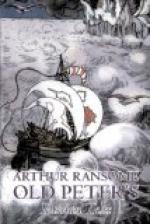“I know nothing about it,” says the shepherd, and he tells them about the mound and the reed and the flowers, and how he cut the reed and made the whistle-pipe, and how the whistle-pipe does its playing by itself.
And as he was going through the village, with all the people crowding about him, the old merchant, that one who was the father of the two bad ones and of the little pretty one, came along and listened with the rest. And when he heard the words about the silver saucer and the transparent apple, he snatched the whistle-pipe from the shepherd boy. And still it sang:—
“Play, play, whistle-pipe! Bring happiness to my dear father and to my little mother. I was killed—yes, my life was taken from me in the deep forest for the sake of a silver saucer, for the sake of a transparent apple.”
And the old merchant remembered the little good one, and his tears trickled over his cheeks and down his old beard. Old men love little pigeons, you know. And he said to the shepherd,—
“Take me at once to the mound, where you say you cut the reed.”
The shepherd led the way, and the old man walked beside him, crying, while the whistle-pipe in his hand went on singing and reciting its little song over and over again.
They came to the mound under the birch tree, and there were the flowers, shining red and blue, and there in the middle of the mound was the Stump of the reed which the shepherd had cut.
The whistle-pipe sang on and on.
Well, there and then they dug up the mound, and there was the little girl lying under the dark earth as if she were asleep.
“O God of mine,” says the old merchant, “this is my daughter, my little pretty one, whom we called Little Stupid.” He began to weep loudly and wring his hands; but the whistle-pipe, playing and reciting, changed its song. This is what it sang:—
“My sisters took me into the forest to look for the red berries. In the deep forest they killed poor me for the sake of a silver saucer, for the sake of a transparent apple. Wake me, dear father, from a bitter dream, by fetching water from the well of the Tzar.”
How the people scowled at the two sisters! They scowled, they cursed them for the bad ones they were. And the bad ones, the two sisters, wept, and fell on their knees, and confessed everything. They were taken, and their hands were tied, and they were shut up in prison.
“Do not kill them,” begged the old merchant, “for then I should have no daughters at all, and when there are no fish in the river we make shift with crays. Besides, let me go to the Tzar and beg water from his well. Perhaps my little daughter will wake up, as the whistle-pipe tells us.”
And the whistle-pipe sang again:—
“Wake me, wake me, dear father, from a bitter dream, by fetching water from the well of the Tzar. Till then, dear father, a blanket of black earth and the shade of the green birch tree.”




